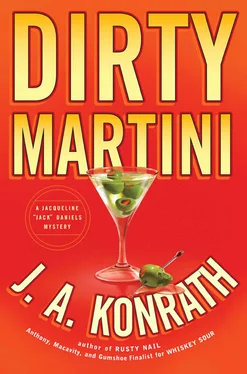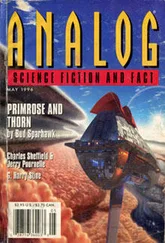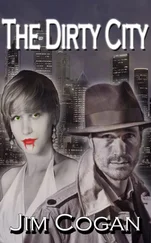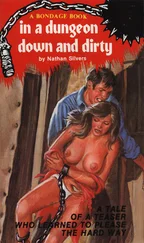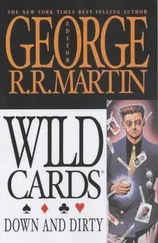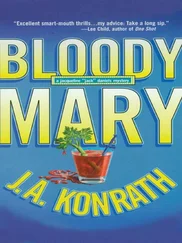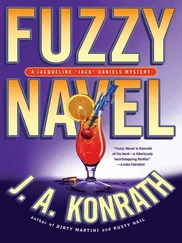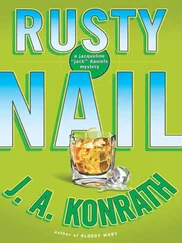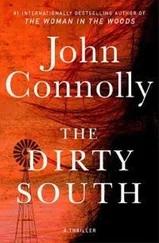Which is why I left Reynolds in charge and hopped in the car, ready to head home. It was only a little past noon, and I felt like I’d been awake for a year.
I doubted we’d pick up the Chemist today. If he did stop by, all of the police vehicles still in the parking lot would scare him off. But I felt pretty good that we would eventually catch him. He’d gone through a lot of trouble and risk to steal the case files from Records. There had to be something in there worth protecting. And though Alger and his partner were dead, and those files were gone, the information they contained was still available if I dug deep enough.
This wouldn’t end in a dramatic gun battle, or a climactic chase. It would end in a warrant and a quiet arrest. But it would end. I was sure of it.
I took 290, heading back to my house. I was making damn good time too, so good, I might actually make the trip in less than an hour. I would take a shower, maybe do a little napping, then visit Latham.
Which is why it was especially surprising to me when I exited on Harlem and headed north. Bensenville wasn’t north. The hospital wasn’t north. Elmwood Park was north. Elmwood Park, where Wilbur Martin Streng lived.
“This isn’t a good time,” I said to myself.
But I kept going, on my way to visit a man I thought died about forty years ago.
THE CHEMIST DRIVES PAST Chateau Élan, sees the police brigade camped out in the parking lot, and doesn’t even slow down.
The cops figured it out fast. Very fast. But it doesn’t matter. That’s only a side bet. The big wager hasn’t been placed yet.
He thinks about tomorrow. If everything goes according to the Plan, the death toll will be in the tens of thousands. And there will be drastic afteraffects as well. Panic. Riots. Widespread terror. Crime will spin out of control, with no one to stop it.
It’s more than simple revenge. It will teach the world an important lesson.
And the best part of all is that no one will see it coming.
He heads home to make the final preparations.
WHAT DO YOU SAY to a dead man?
I started with, “Hello.”
Elmwood Park blended into Chicago on the west side. It was small but densely packed, predominantly white middle-class, mostly residential. Wilbur Streng lived in a small beige house on a small piece of property, bordered on either side by equally small houses, at Belden and Seventy-third. There was room for me to park on the street legally, but I chose a hydrant out of habit.
I didn’t need to psych myself up, or check my makeup, or consider what I was going to say. I was on autopilot, acting without thinking. After parking, I walked up to his door and pressed the bell, and a minute later an old man answered.
I expected some sort of emotion on my part, some sort of internal dam breaking. But I felt nothing. The person standing before me didn’t look anything like the memories, or photos, I had of my father. He was stooped with age, which put him at my height. More liver spots on his head than hair. Thick glasses, and a lot of loose skin on the face and neck. Slightly built, but with a small pot belly.
“Figured you’d come by someday. Might as well come in.”
And then the dam broke. I’d forgotten what he sounded like. Is that odd? To forget a parent’s voice? But when he spoke, I realized I hadn’t forgotten it at all. I could never forget it. That voice had read me countless bedtime stories, had answered my questions about lions and thunder and airplanes, had helped me with my homework, had said I love you so many times. That same voice had bought me three ice creams and never gotten angry.
My father’s voice. Dad’s voice.
I felt my throat begin to tickle and my chest get heavy, but I stayed outwardly calm.
“You… know who I am?”
“Saw you on TV, many times. In the paper too. Your mother finally tell you?”
“She told me you were dead.”
He nodded. “It was easier that way. You coming in?”
I wasn’t sure if I wanted to. Still, my feet followed his into the house, and the door closed behind me with a surreal, otherworldly feeling.
The house was dark, clean. It smelled of lemon polish and cigar smoke. We passed a living room with a leather couch, a TV, an old hi-fi. Paintings on the wall, mostly of wooded landscapes, in heavy ornate frames that were popular in the ’70s. Lots of wood paneling. Lots of wood everything. The kitchen was also done in brown, tile and wallpaper. Tidy, but without any overt personality.
“Would you like coffee? I have some from earlier.”
He indicated the green percolator on the counter. I didn’t want coffee, but I suddenly felt uncomfortable and I wanted to have something to do with my hands.
“Coffee is fine.”
“Cream or sugar?”
“Black.”
He grunted, like he expected that, and took a mug out of the drying rack in the sink.
“Got this machine about thirty years ago. Still brews a decent cup.”
So he didn’t abandon appliances, only families. He handed me the mug, and I was grateful for the warmth.
“Your mother tell you why?” he asked. He sat across from me at the kitchen table.
“She wrote a letter. You said you hated her, hated me, and didn’t want to have anything to do with us ever again.”
Wilbur grunted again.
“Is that true?” I asked.
“No. I was always fond of you, and your mother. It hurt like hell to leave.”
“So why did you?”
“I had to.”
I pushed down the anger, which was gathering like a storm in my head.
“Another woman?” I asked.
Wilbur laughed.
“No. If that were the case, I would have told your mother.”
“So what happened? You woke up one morning, decided you no longer wanted the responsibility?”
Wilbur stared at me for a long time, and for a moment I wondered if he’d died with his eyes open. I was almost ready to reach out and feel his pulse, when he said, “How is your mother doing?”
“She’s doing fine. And you’re avoiding the question.”
“I suppose I am. I’ve… thought about this moment. Many times. You, being here. Sometimes you’re yelling at me, screaming. Sometimes you’re crying. Sometimes you even pull a gun on me. I always start off by trying to explain how things were different back in the sixties. It’s not like it is today. Men were expected to act like men. I could have done the easy thing. I could have stayed and lived a lie.”
Some anger seeped out. “You’re acting like leaving your family was courageous.”
“You asked me if I no longer wanted the responsibility. I always wanted the responsibility.” Wilbur’s eyes got glassy. “The day you were born, I promised to-”
“Stop.”
“-take care of you, forever. I made that same promise to your mother, on our wedding day.”
“Which is why you abandoned us, left us with nothing.” I folded my arms. “You never tried to contact us, never gave us a dime.”
Wilbur stood up, walked to the percolator, and took a fresh mug from the cabinet. He poured himself some coffee, sipped it slowly.
“It was easier to walk out of your lives than have you and your mother deal with… everything. I had to play the bad guy.”
“Why?”
“Because the truth would have hurt more.”
“And what is the truth?”
Wilbur didn’t answer. I decided I’d had enough of this. It was only making me angry. I stood up.
“Thanks for the coffee, Dad . Maybe we can do this again in another forty years.”
“Jacqueline, wait…”
I left the kitchen, walked down the hall, and noticed some pictures hanging on the wall. One was a baby photo of me. I pulled it down and stared at it.
Читать дальше
